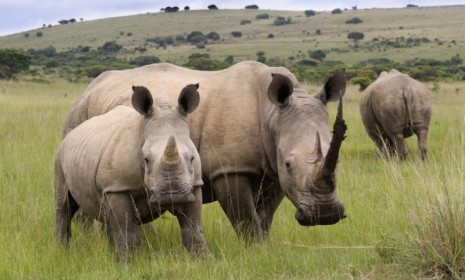Organized crime's ruthless slaughter of wild animals
Beasts from rhinos to cat-sized anteaters face extinction as international smugglers sell valuable body parts to the Chinese

A free daily email with the biggest news stories of the day – and the best features from TheWeek.com
You are now subscribed
Your newsletter sign-up was successful
Forget drugs and gun-running. Organized crime has found a lucrative new way to make billions of dollars in the illegal trafficking of animal parts. As the journal Oryx reports, a powerful network of international crime syndicates is whacking thousands of endangered animals, some of which are facing extinction as a result. Though conservationists are sounding alarms, law-enforcement officials are hamstrung in their efforts to prevent ruthless, Mafia-style poachers from slaughtering animals on a scale never before seen. Four key questions:
What kinds of animals are being killed?
Creatures great and small. Elephants, tigers, and antelopes are being killed by the thousands every year. More than 330 rhinos were killed in South Africa alone during 2010, nearly one a day. "At this rate, they will soon be wiped out," says anti-poaching activist Kevin Bewick, as quoted by Discovery News. A menagerie of smaller, lesser-known animals are also threatened. Illegal smuggling is increasing the rarity of both the pangolin, an endearing anteater about the size of a house cat, and the loris, a little monkey weighing just three pounds.
The Week
Escape your echo chamber. Get the facts behind the news, plus analysis from multiple perspectives.

Sign up for The Week's Free Newsletters
From our morning news briefing to a weekly Good News Newsletter, get the best of The Week delivered directly to your inbox.
From our morning news briefing to a weekly Good News Newsletter, get the best of The Week delivered directly to your inbox.
Why are these wild animals so valuable?
Members of the burgeoning affluent class in China and other Asian countries are willing to spend billions each year on these animals, sometimes as exotic pets, but mostly for their body parts. Rhino horns and tiger skulls, for example, are believed to have aphrodisiac qualities or other "magical" properties. Bear paws, shark fins, loris feet, turtle shells, and other appendages all fetch a high price on the international black market.
How are criminals getting away with it?
Like drug smugglers and other organized criminals, those in the $10 billion-a-year business of wild animal smuggling use an array of tools to thwart law enforcement agencies. Cells phones, forged shipping documents, and e-commerce sites (the locations of which are difficult to track) are common among animal traders. Smugglers also use hidden compartments in shipping containers and rapidly changing routes to keep police at bay.
A free daily email with the biggest news stories of the day – and the best features from TheWeek.com
Is anything being done to stop the slaughter?
Yes, but law enforcement is struggling against near-impossible odds to fight poachers and smugglers. Manpower and money are the biggest problem, as police often find they're outmanned, outgunned, and outsmarted. Interpol, for example, has only one person in charge of wildlife crime enforcement. Corruption exacerbates the mess, says Asawin Suebsaeng at Mother Jones: "Many wildlife enforcement agencies in poor countries can be bribed out of effectiveness."
Sources: Discovery, Mother Jones, Science Daily
-
 Why is the Trump administration talking about ‘Western civilization’?
Why is the Trump administration talking about ‘Western civilization’?Talking Points Rubio says Europe, US bonded by religion and ancestry
-
 Quentin Deranque: a student’s death energizes the French far right
Quentin Deranque: a student’s death energizes the French far rightIN THE SPOTLIGHT Reactions to the violent killing of an ultraconservative activist offer a glimpse at the culture wars roiling France ahead of next year’s elections
-
 Secured vs. unsecured loans: how do they differ and which is better?
Secured vs. unsecured loans: how do they differ and which is better?the explainer They are distinguished by the level of risk and the inclusion of collateral